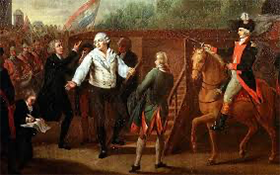The National Convention of France
Part 1: Earlier Legislative Bodies The National Convention was a gathering of French people whose task was to write another constitution while their country was in the midst of the French Revolution and in the throes of a war with its neighbors. 
The Legislative Assembly, created by the Constitution of 1791, had been the country's supreme lawmaking body since Oct, 1, 1791. Like much of French society at the time, the Assembly had its share of disagreements. Two of the leading factions of deputies within the Assembly were the Girondins and the Montagnards. The former wanted to maintain the constitutional monarchy–and, therefore, the king–designed by the Constitution; the latter pursued a more radical agenda and increasingly issued calls for the dissolution of the monarchy. France had declared war on Austria on April 20, 1792, and early expeditions were not at all favorable to the French war effort. During the first half of that year, King Louis XVI had also vetoed several bills passed by the Legislative Assembly, most prominently a bill labeling émigrés–people, mostly nobles, who had left the country and, in many cases, had conducted political intrigue from without. Another disappointment for the Assembly was the king's veto of a decree that required religious authorities to take the civic oath. 
Louis had also, under the terms of the Constitution of 1791, held on to the power of appointing his ministers. Of those he appointed in 1791, many were Feulliants and several more had no business having their jobs. By the summer of 1792, the Jacobins had taken control of the Assembly and were advancing their advocacy of removal of the king at every opportunity. On August 10, things boiled over entirely and a group of protesters stormed the Tuileries, seizing the king and the royal family and placing them in lockdown in the Square du Temple. Meanwhile, the Legislative Assembly called for a new National Convention, which met for the first time on Sept. 20, 1792. Significantly, the Convention was France's first legislative body whose members were elected by men of all social classes. The result was a group of 749 deputies who had some experience in politics: Most were lawyers, a few dozen were members of the clergy, and eight were nobles. Of those 749, several dozen had served in the National Constituent Assembly and nearly 200 had been part of the Legislative Assembly. Just the day before, French forces won the Battle of Valmy and turned the tide of the war. French victories continued, and this certainly eased the pressure on the new governmental body. At the same time, however, the violence in Paris continued. Overshadowing the Convention election to a certain extent were the September Massacres, a purge by sans-culottes of Paris prisoners known to have opposed the Revolution. The Convention had a President, who served for a grand total of two weeks but could be re-elected, after a waiting period of another fortnight. The real power of the National Convention lay in the committees. As in the Legislative Assembly, the Girondins and Montagnards held court in a state of constant opposition. The majority of the deputies were moderates who belonged to a grouping known as the Plain; they had no established ideology and were not a unified group. One of the ways in which the Convention set itself on a brand new path was to declare that France had a new calendar. Gone was the seven-day week; instead, citoyens were told that the week had 10 days. As well, France had a new calendar, with new names for the months. More ominously, the Convention called the king to trial, on Dec. 11, 1792. The main charge was treason, stemming from his attempt to flee the country in June 1791. The Convention also charged the king with attempting to ally with France's enemies in order to engineer an overthrow of the government and reinstate himself as the supreme head of the state. 
Many republicans in the Convention wanted the end of the monarchy in any form and many who wanted the king dead. Foremost among these was Maximilien Robespierre, who declared that, "Louis must die so the nation may live." After a series of spirited debates, the Convention voted to convict the king. That vote was unanimous. The debate then turned to how to punish the king. That ended in a vote as well, and many deputies voted against execution. However, a majority did, and so the king indeed was put to death, on Jan. 21, 1793. Among his last words were these: "I die innocent of all the crimes laid to my charge; I Pardon those who have occasioned my death; and I pray to God that the blood you are going to shed may never be visited on France." Next page > The Revolution Progresses > Page 1, 2 |
|
Social Studies for Kids
copyright 2002–2026
David White




